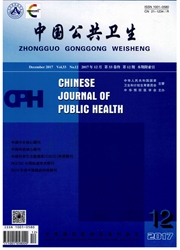

 中文摘要:
中文摘要:
目的对不同人口学特征的医生工作付出-回报失衡感进行比较,以发现工作付出-回报失衡重点人群,并探讨医生工作付出-回报失衡的影响因素。方法采用多阶段分层抽样方法抽取山东省济南、潍坊、德州3个市的1 910名医生,利用课题组编制的公立医院医生工作感受量表进行调查,并对数据进行描述性分析、方差分析和单因素非条件logistic回归分析。结果 55.7%的医生自感处于工作付出-回报中高度失衡状态;学历、职称、是否为临床教师和月均收入对医生工作付出-回报失衡感均有影响(P〈0.05);其中,学历方面:学历越高失衡感越强,失衡感最强的是博士学历者[(1.79±0.75)分];职称方面:失衡感最低的是未定职称者[(1.40±0.73)分],失衡感最强的是住院医师[(1.57±0.79)分]和主治医师[(1.57±0.74)分];临床教师[(1.66±0.77)分]失衡感高于非临床教师[(1.52±0.74)分];收入方面:随着收入水平升高,医生工作付出-回报失衡感递减,其中以月均收入≤2000元者[(1.61±0.87)分]失衡感最强,月均收入≥5 001元者[(1.40±0.56)分]失衡感最低;对医生工作付出-回报失衡影响最大的前3位因素为职业风险(β=0.22)、学习压力(β=0.18)和精神付出(β=0.17)。结论应重点关注高学历、低职称、低收入等特征医生的工作付出-回报失衡现象。
 英文摘要:
英文摘要:
Objective To compare the status of effort-rew ard imbalance(ERI) among the doctors with different demographic characteristics and to explore influencing factors of ERI for the identification of the staff at higher risk of ERI.Methods By using multi-stage stratified random sampling,1 910 doctors were selected from hospitals in Ji'nan,Weifang,and Dezhou city and surveyed with a self-designed Doctor Job Feel Scale. Descriptive analysis,one-w ay analysis of variance,and non-conditional logistic regression were adopted in data analyses. Results There were 57. 1% of the doctors reporting perceived high-level ERI. The perceived ERI was significantly influenced by education background,professional title,whether being a doctor responsible for clinical lecture,and monthly income(all P〈0. 05);the perceived ERI was positively associated with education background,with the highest ERI level(1. 79 ± 0. 75) among the doctors with doctor degree;the doctors without professional title had the low est ERI(1. 40 ± 0. 73),whereas the resident doctors and doctors-in-charge had higher ERI(1. 57 ± 0. 79 and 1. 57 ± 0. 74) than the doctors with other professional title;doctors undertaking the role of clinical lecture had a higher ERI than those simply being a clinician(1. 66 ± 0. 77 vs. 1. 52 ± 0. 70);the perceived ERI was inversely correlated with income level,with the highest ERI score(1. 61 ± 0. 87) for the doctors with a monthly income less than 2 000 RM B yuan and the low est score(1. 40 ± 0. 56) for those with more than 5 001 RM B yuan. Occupational risk(β = 0. 22),study pressure(β = 0. 18),and emotional control(β = 0. 17) were the top three influencing factors for perceived ERI among the doctors. Conclusion Attention should be paid to ERI among doctors,especially among those with higher educational background and those with low er academic title and income.
 同期刊论文项目
同期刊论文项目
 同项目期刊论文
同项目期刊论文
 期刊信息
期刊信息
